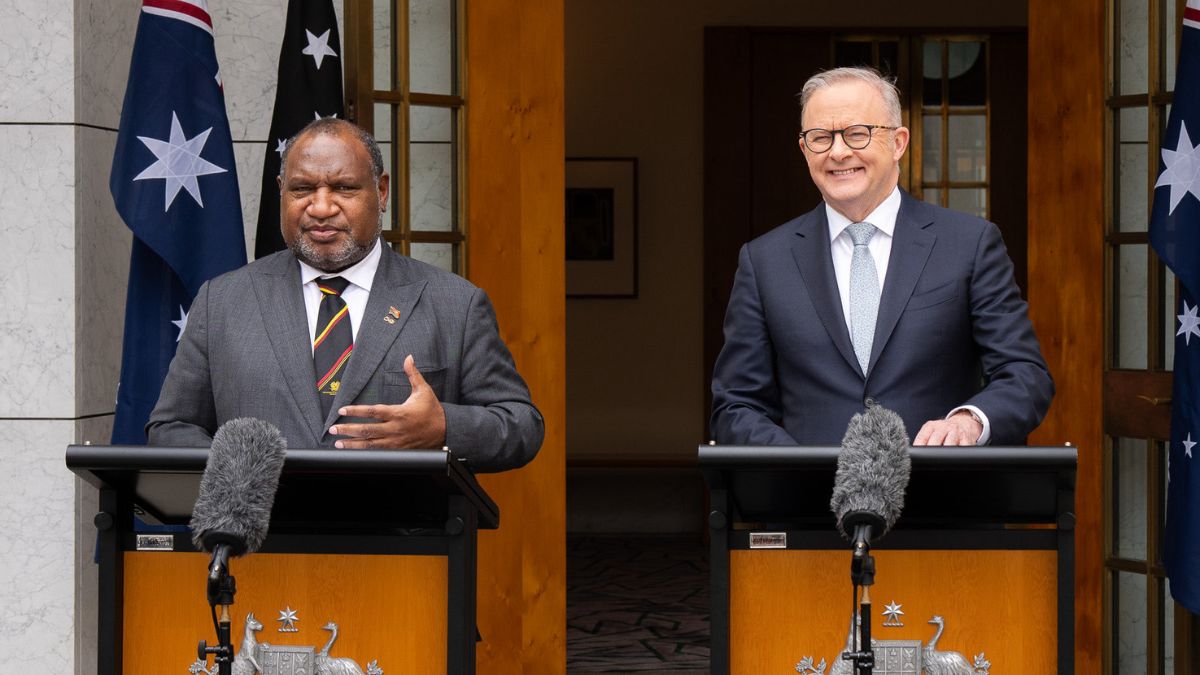Australia, Papua New Guinea Sign Landmark Defense Treaty Amid China’s Pacific Concerns

The pact was signed in Canberra by Australian Prime Minister Anthony Albanese and Papua New Guinea’s Prime Minister James Marape. Image courtesy: X.com/@AlboMP
Australia and Papua New Guinea (PNG) on Monday (September 6, 2025) signed a historic bilateral defence treaty that both nations hailed as a milestone in regional security cooperation, but one that Beijing views as targeting its interests in the Pacific.
The pact, signed in Canberra by Australian Prime Minister Anthony Albanese and Papua New Guinea’s Prime Minister James Marape, establishes a mutual defence framework allowing unprecedented integration between the two countries’ armed forces and personnel.
It represents Australia’s only alliance-level security treaty outside the 1951 ANZUS pact with the United States and New Zealand, and PNG’s first such agreement in its history.
What does the Treaty entail?
Under the treaty, both nations commit to act together in response to an armed attack on either country. “This treaty contains a mutual defence obligation similar to Australia’s ANZUS Treaty commitments, where we declare that in the event of an armed attack on either of our countries, we would both act to meet the common danger,” Albanese said during a joint press conference with Marape at Australia’s Parliament House.
Albanese described the pact as “a great honor,” saying it formalizes PNG as Australia’s “newest ally” and strengthens the shared goal of maintaining peace and stability in the Indo-Pacific. He also emphasised that both countries had agreed not to enter into any agreements that would compromise the treaty’s implementation.
The treaty will come into force once it is ratified by both nations’ parliaments.
How has China reacted to the Treaty?
However, the move has drawn a cautious reaction from China, which has been expanding its presence across the South Pacific.
Following the signing of a joint declaration in support of the treaty last month, the Chinese Embassy in Port Moresby warned that such agreements “should not be exclusive in nature” or “target any third party.”
Prime Minister Marape, however, dismissed concerns of alignment against China, reaffirming PNG’s independent foreign policy of “friends to all, enemy to none.”
He stressed that the new treaty does not undermine PNG’s relations with other nations. “This is not a treaty that sets up enemies but consolidates friendships. We have told China that Australia has become our security partner of choice, and they understand,” Marape said.
What would be the regional impact of the Treaty?
The agreement highlights PNG’s delicate balancing act, deepening defence cooperation with Australia and the US, while continuing to seek economic engagement with China, its largest trading partner.
Australia has accelerated its outreach to Pacific island nations since 2022, after China signed a security pact with the Solomon Islands, sparking concerns over potential Chinese military bases in the region. Canberra is also negotiating a similar defence agreement with Fiji.
Beyond Australia and New Zealand, Papua New Guinea, Fiji, and Tonga are the only Pacific island nations maintaining standing militaries, making them critical players in the region’s evolving strategic landscape.
As geopolitical competition intensifies, the Australia–PNG Defence Treaty marks a defining moment in the Pacific’s security architecture, one that strengthens regional ties but adds a new dimension to the broader contest for influence between Western allies and China.







